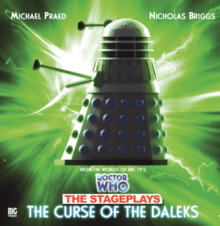The Curse of the Daleks
| The Curse of the Daleks | |
|---|---|
 A programme for The Curse of the Daleks | |
| Written by |
David Whitaker Terry Nation |
| Date premiered | 21 December 1965 |
| Place premiered |
Wyndham's Theatre London |
| Original language | English |
| Genre | Science Fiction |
The Curse Of The Daleks is a Dalek stage play, written by David Whitaker and Terry Nation, which appeared for one month at the Wyndham's Theatre in London beginning 21 December 1965. It is notable for being Terry Nation's first live action attempt to exercise his ownership of the Dalek concept independently of the BBC. As such, it does not include the character of the Doctor, the TARDIS or any other elements from the Doctor Who television series. Produced by John Gale and Ernest Hecht, and directed by Gillian Howell, it was performed mostly as a matinée indicating that children were the intended primary audience.
Synopsis
Following the crash landing of an Earth spacecraft on Skaro, one of the astronauts believes he can turn the Daleks into his servants. As ever, the Daleks have other plans.
Background
Freelance writers for the BBC were allowed to retain intellectual property rights over concepts and characters they introduced into individual serials. As a result, Terry Nation found himself co-owning the Dalek phenomenon of the mid-1960s. Nation was eager to find some way of divorcing them from the Doctor Who universe so that he could build a franchise which would not require BBC cooperation, and two such attempts were made in 1965.
One was the Doctor and companionless episode Mission to the Unknown. Though commonly known as an introduction to the Doctor Who serial, The Daleks' Master Plan, it was also preparatory to a proposed Dalek-only pilot called, The Destroyers.[1] Had it been completed, The Destroyers would have been centred on the same "Space Security Service" seen in Mission to the Unknown and Master Plan.
The play was the second attempt, which introduced the idea of the accidental human discovery of the planet Skaro (similar to the storyline of the TARDIS crew in The Daleks), and the humans' subsequent reaction against the Daleks.
While this was the only one of the approaches to be produced on the strength of Terry Nation's ownership alone, it received no further independent development. Elements from this play were later reworked by David Whitaker for the Second Doctor television story The Power of the Daleks.
Cast
- Nicholas Hawtrey as Captain Redway
- Edward Gardener as Rocket Smith
- David Ashford as Bob Slater
- John Moore as Professor Vanderlyn
- Hilary Tindall as Marion Clements
- John Line as Jonathan Ladiver
- Colin Miller as Hary Sline
- Nicholas Bennet as Dexion
- Suzanne Mockler as Ijayna
- Daleks - uncredited
Reception
The Times newspaper's anonymous critic gave The Curse of the Daleks a mixed but generally positive assessment in a review published on 22 December 1965. "No less compelling on the stage than the television screen, the Daleks are the undoubted stars of this futuristic adventure story," opened the piece. The reviewer concluded that: "After their false start, depending too much on weak jokes and technical jargon, a feeling of genuine crisis is generated. And the patience of the youthful matinée audience is rewarded as the Dalek menace increases. Despite the rather stilted dialogue, the actors play with all possible conviction, and Gillian Howell's direction has the necessary pace."[2]
Audio adaptation
| The Curse of the Daleks | |
|---|---|
 | |
| Big Finish Productions audio drama | |
| Series | Doctor Who: The Stageplays |
| Release number | 3 |
| Featuring | The Daleks |
| Writer |
David Whitaker Terry Nation |
| Director | Nicholas Briggs |
| Executive producer |
Nicholas Briggs Jason Haigh-Ellery |
| Production code | BFPDWSPCD03 |
| Release date | November 2008 |
In 2008 Big Finish Productions released The Curse of the Daleks as an audio drama, directed by Nicholas Briggs.
Cast
- Patric Kearns as Captain Redway
- Nick Wilton as Rocket Smith
- James George as Bob Slater
- John Line as Professor Vanderlyn
- Beth Chalmers as Marion Clements
- Michael Praed as Jonathan Ladiver
- Derek Carlyle as Hary Sline
- Glynn Sweet as Dexion
- Denise Hoey as Ijayna
- Nicholas Briggs as the Daleks / Narrator
For a time an animated CGI version of The Curse Of The Daleks, created by Doctor Who enthusiast Stuart Palmer, was available to view on line. It was removed so as not to compete with the Big Finish audio adaptation. A number of still images and reviews of the production remain, located on the website www.alteredvistas.co.uk.
References
- ↑ Mission to the Unknown at Doctor Who: A Brief History of Time (Travel)
- ↑ "The Daleks Come to Life". The Times. 1965-12-22. p. 11.
External links
| ||||||
| ||||||||||||||||||||||||||||||||||||||||||||||||||||||||||||||